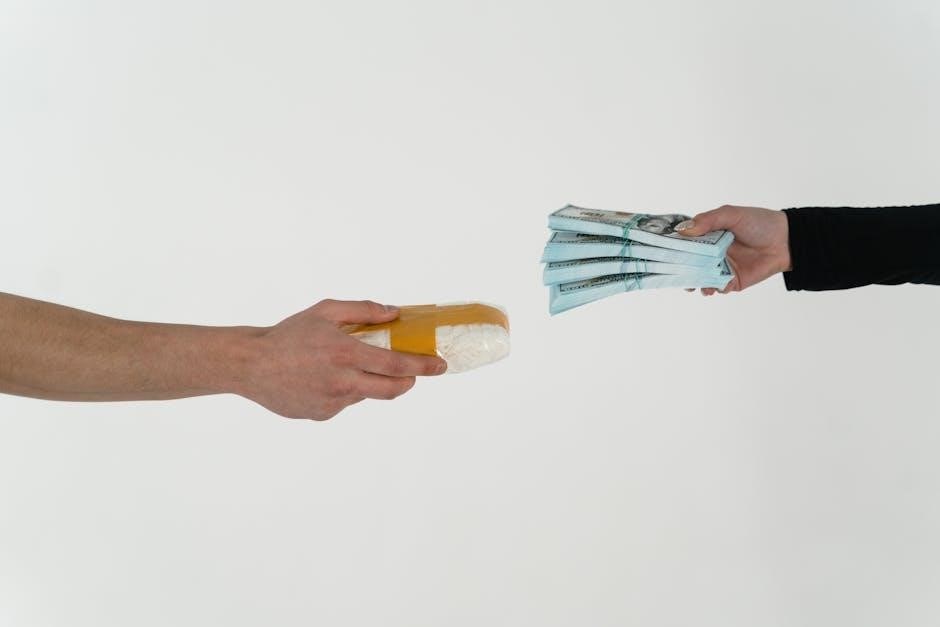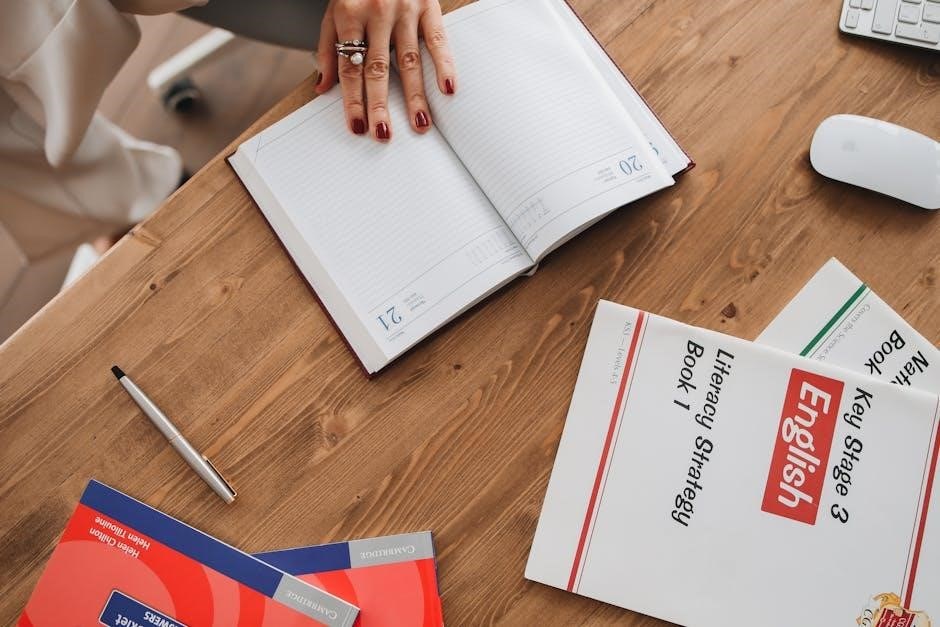The Addiction Treatment Homework Planner is a comprehensive tool designed to enhance addiction recovery through structured exercises and evidence-based strategies, promoting long-term sobriety and personal growth effectively.
1.1 Overview of the Planner
The Addiction Treatment Homework Planner is a structured, evidence-based resource designed to support individuals in their recovery journey. It provides a comprehensive framework for addressing addiction, offering practical exercises, worksheets, and activities tailored to specific needs. The planner is organized into sections that focus on key aspects of recovery, such as understanding addiction, managing triggers, and developing coping strategies. Its adaptable design allows users to personalize their approach, making it suitable for various types of addiction and recovery stages. By fostering accountability and self-reflection, the planner empowers individuals to take an active role in their healing process. It serves as a valuable companion for both therapy sessions and independent work, promoting sustainable progress and long-term sobriety.
1.2 Importance of Homework in Addiction Treatment
Homework plays a vital role in addiction treatment by bridging the gap between therapy sessions and daily life. It provides individuals with practical tools to apply recovery skills in real-world situations, reinforcing new behaviors and thought patterns. Through exercises like journaling, reflection, and coping strategy practice, homework helps individuals identify triggers, develop self-awareness, and build resilience. Regular assignments foster accountability and encourage active participation in the recovery process. This consistent practice strengthens the foundation for long-term sobriety and personal growth, making homework an essential component of effective addiction treatment. By integrating homework into their routine, individuals can better navigate challenges and maintain progress outside of formal therapy settings.

What is the Addiction Treatment Homework Planner?
The Addiction Treatment Homework Planner is a practical guide for professionals and individuals, offering structured exercises and activities to support recovery from substance abuse and behavioral addictions.
2.1 Definition and Purpose
The Addiction Treatment Homework Planner is a specialized resource designed to aid individuals in recovery by providing structured, evidence-based exercises and activities. Its primary purpose is to support the recovery process by helping individuals identify and address underlying issues contributing to their addiction. The planner serves as a bridge between therapy sessions, enabling individuals to practice skills and reflect on their progress. It is tailored for both professionals and individuals, offering a user-friendly format that promotes accountability and engagement. By focusing on measurable goals and actionable steps, the planner aims to empower individuals to take an active role in their recovery journey. Its ultimate purpose is to facilitate lasting behavioral change and improve overall well-being.
2.2 Structure and Components
The Addiction Treatment Homework Planner is organized into clear sections designed to facilitate structured and guided recovery work. It typically includes daily or weekly schedules, exercises, and reflection spaces to track progress. The planner incorporates evidence-based activities such as cognitive-behavioral exercises, mindfulness practices, and relapse prevention strategies. Additional components may involve goal-setting templates, self-assessment tools, and educational resources to enhance understanding of addiction and recovery. Many versions also include space for noting triggers, cravings, and coping mechanisms, allowing individuals to identify patterns and develop healthier responses. The planner’s structure is user-friendly, making it accessible for both individuals and professionals to monitor and support the recovery process effectively. Its comprehensive design ensures a holistic approach to addiction treatment.

Benefits of Using the Addiction Treatment Homework Planner
The Addiction Treatment Homework Planner enhances accountability, motivation, and therapy outcomes by providing structured exercises that promote personal growth and long-term recovery success.
3.1 Improved Accountability and Motivation
The Addiction Treatment Homework Planner fosters accountability by assigning structured tasks that encourage clients to take ownership of their recovery journey. Regular homework assignments create a sense of responsibility, helping individuals stay committed to their goals. The planner also boosts motivation by providing clear, achievable objectives that allow clients to track their progress. Seeing tangible results from completed exercises enhances self-confidence and reinforces the importance of active participation in therapy. Additionally, the planner’s structured format helps individuals develop a routine, which is crucial for maintaining focus during the recovery process. By fostering accountability and motivation, the planner empowers clients to remain dedicated to their long-term sobriety and personal growth.
3.2 Enhanced Therapy Outcomes
The Addiction Treatment Homework Planner significantly enhances therapy outcomes by bridging the gap between sessions and reinforcing the skills learned during therapy. By engaging in structured homework exercises, clients apply recovery strategies in real-life situations, deepening their understanding and implementation of therapeutic concepts. This active participation leads to faster progress and more sustainable results. The planner also ensures continuity of care, as clients remain focused on their recovery goals between sessions. Over time, this consistent effort fosters lasting behavioral changes and strengthens the client’s ability to manage triggers and challenges effectively. Ultimately, the planner’s homework assignments empower individuals to achieve more meaningful and enduring outcomes in their addiction recovery journey.

How to Use the Addiction Treatment Homework Planner Effectively
Establishing a consistent routine and setting clear objectives are key to effectively using the Addiction Treatment Homework Planner, ensuring steady progress and meaningful reflection.

4.1 Setting Clear Goals and Objectives
Setting clear goals and objectives is essential for effective use of the Addiction Treatment Homework Planner. By defining specific, measurable, achievable, relevant, and time-bound (SMART) goals, individuals can create a roadmap for their recovery journey. These goals should align with their personal values and long-term aspirations, ensuring a sense of purpose and direction. The planner provides structured exercises to help users identify and prioritize their objectives, whether related to reducing substance use, improving mental health, or rebuilding relationships. Breaking down larger goals into smaller, manageable tasks fosters a sense of accomplishment and progress. Regularly reviewing and updating these goals with a therapist or support system ensures accountability and adaptability, keeping the recovery process focused and meaningful.
4.2 Tracking Progress and Reflection
Tracking progress and reflection are vital components of the Addiction Treatment Homework Planner, enabling individuals to monitor their journey and gain insights into their growth. The planner includes space for weekly check-ins, where users can document achievements, challenges, and setbacks. Reflecting on these entries helps identify patterns, strengths, and areas needing improvement. This process fosters self-awareness and accountability, key elements in sustained recovery. Additionally, the planner encourages users to celebrate milestones, reinforcing motivation and resilience. Regular reflection also allows for adjustments to strategies, ensuring the recovery plan remains effective and aligned with personal goals. By consistently reviewing progress, individuals can maintain focus, build confidence, and deepen their commitment to long-term sobriety and well-being.

Common Exercises and Activities in the Planner
The planner features diverse exercises, including cognitive-behavioral techniques, mindfulness practices, and relapse prevention strategies, designed to help users understand addiction, develop coping skills, and maintain sobriety.

5.1 Cognitive-Behavioral Therapy (CBT) Exercises
Cognitive-Behavioral Therapy (CBT) exercises in the planner help individuals identify and challenge negative thought patterns linked to addiction. Activities include identifying triggers, restructuring harmful beliefs, and practicing coping skills. Users learn to recognize how thoughts influence behaviors and develop healthier ways to respond to cravings or stressful situations. Exercises like thought records and behavior charts encourage self-awareness and accountability. These tools empower individuals to manage emotions effectively and adopt positive habits, reducing the risk of relapse. By addressing the root causes of addiction, CBT exercises in the planner promote lasting behavior change and support long-term recovery.
5.2 Mindfulness and Relapse Prevention Activities

Mindfulness and relapse prevention activities in the planner focus on helping individuals develop present-moment awareness and strategies to avoid relapse. Exercises include guided meditations, breathing techniques, and reflective journaling to enhance emotional regulation. Users learn to identify early warning signs of relapse and develop actionable plans to manage high-risk situations. Activities such as creating a relapse prevention checklist and practicing gratitude promote resilience and self-awareness. These tools empower individuals to stay grounded, reduce cravings, and build a stronger foundation for long-term recovery. By integrating mindfulness practices, the planner helps users cultivate a sense of calm and confidence in maintaining sobriety.

Tailoring the Planner to Different Types of Addiction
The Addiction Treatment Homework Planner can be customized for various addictions, offering tailored strategies for substance abuse, behavioral addictions, and dual diagnoses, ensuring effective and personalized recovery support.

6.1 Substance Abuse Focus
The Addiction Treatment Homework Planner is highly adaptable for individuals struggling with substance abuse, offering exercises tailored to address the unique challenges of drug and alcohol addiction. It incorporates evidence-based strategies, such as cognitive-behavioral techniques, to help individuals identify triggers and develop coping mechanisms. The planner also includes activities focused on relapse prevention, mindfulness, and lifestyle changes to support long-term recovery. By providing structured yet flexible exercises, it empowers individuals to take an active role in their recovery journey, fostering accountability and self-awareness. The substance abuse focus ensures that users receive targeted guidance to overcome addiction-specific barriers, making the planner a versatile and effective tool for clinicians and individuals alike.
